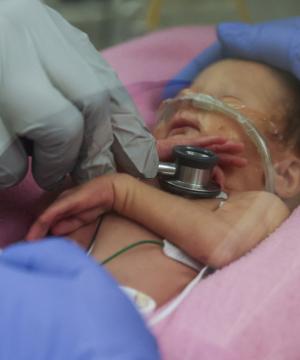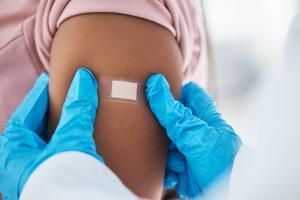Table of ContentsClose

The latest news from UI Health Care
News briefs

On Jan. 31, approximately 1,000 former Mercy Iowa City hospital providers and team members joined University of Iowa Health Care as ownership of the hospital officially transferred to UI Health Care, preserving local access to health care and jobs in eastern Iowa.
The transition of Mercy Iowa City hospital—now known as UI Health Care Medical Center Downtown—marks a new chapter for health care in the Iowa City area and the entire state, notes Denise Jamieson, MD, MPH, UI vice president for medical affairs and the Tyrone D. Artz Dean of the Carver College of Medicine.
“This is an opportunity for UI Health Care to move toward a more integrated model of care, helping Iowans get the right care, at the right place, at the right time,” Jamieson says. “Together, we are stronger, and we will use our shared strengths to better serve Iowans.”
The transition of Mercy Iowa City’s 192-bed hospital campus and 10 clinic locations to UI Health Care follows months of planning by leaders from both institutions.
For most of the patients of the former Mercy Iowa City, immediate changes are not expected, and they may continue to schedule and receive care at the UI Health Care downtown location as usual.
All Mercy Iowa City employees in good standing were offered employment with UI Health Care. Community providers not employed by UI Health Care continue to practice at the facility under an open medical staff model.
“We have been working hard to make this transition as smooth as possible for staff, patients, providers, and community members,” said Bradley Haws, CEO of UI Hospitals & Clinics and associate vice president for UI Health Care. “We’re focused on welcoming our new colleagues, maintaining access, and providing continuity of care for patients.”
In addition to maintaining existing services at the downtown location, an evaluation process is underway to review capacity needs, equipment, staffing, systems, processes, and more. Also, an advisory board that includes representatives from the Iowa City community has been assembled to help guide decision-making and assess potential plans moving forward.
Additionally, three downtown campus employees have been added to the Clinical Systems Committee, an internal governance committee of UI Health Care’s clinical operations. And a new committee also will be developed to support the non-employed community health care providers who continue to practice at the downtown campus.

Extremely premature infants who were fed donated breast milk had less than half the rate of a life-threatening disease than those fed formula, according to a multi-center study led by researchers in the University of Iowa Stead Family Department of Pediatrics.
The research team also found that extremely preterm infants—classified as babies born before 29 weeks—who were fed donor milk experienced the same neurological development as those who were fed formula.
Extremely preterm infants are at high risk for neurodevelopmental impairment and necrotizing enterocolitis, a potentially fatal condition in which the lining of the intestines becomes inflamed and dies.
While it is widely accepted that extremely preterm infants fare best when fed breast milk from their own mothers, less was known about the outcomes associated with those fed donated breast milk or formula. The study addressed whether one option was better for their development.
“What we showed in this study is that there was no disadvantage developmentally with the use of donor milk,” says neonatologist Tarah Colaizy, MD, MPH, a professor in the Stead Family Department of Pediatrics and the study’s corresponding author. “We also verified that if you don’t have mother’s milk as a choice, the use of donor milk compared to preterm formula is associated with a decreased incidence of necrotizing enterocolitis.”
The study was published online Jan. 30 in JAMA.
Three Carver College of Medicine faculty members were named to the second cohort of the Stead Family Scholars Program for Early-Career Investigator Research.
Established in 2022 with the support of Jerre and Mary Joy Stead, the program recognizes outstanding early-career faculty who are becoming leaders in their respective fields of research. Stead Family Scholars receive $125,000 per year for three years to pursue studies that promise consequential discoveries. They also receive professional development training in leadership and communication skills.
The 2023 Stead Family Scholars include:

Lyndsay Harshman, MD
11MD, 14F, 18MS
Associate Professor, Pediatrics–Nephrology, Dialysis, and Transplantation
Harshman studies how kidney disease affects children’s cognitive development. She will use the funding to investigate the causes of these previously observed differences in brain development with advanced neuroimaging and animal models.

Alejandro Pezzulo, MD
14F
Associate Professor, Internal Medicine–Pulmonary, Critical Care, and Occupational Medicine
Pezzulo’s lab previously developed a system to measure differences in how cells respond to environmental stimuli. He now aims to develop a “stress test” that could be used to create individualized profiles of cellular response for patients with certain chronic diseases.

Amy Ryan, PhD
Associate Professor, Anatomy and Cell Biology
Ryan’s work concerns a pathway that regulates how lung cells regenerate from damage. Her goal is to find new targets for therapies in a wide range of chronic lung diseases such as chronic obstructive pulmonary disease, asthma, and cystic fibrosis.
Four University of Iowa Carver College of Medicine faculty members received endowed professorship appointments during the college’s fall investiture ceremony in September:

The Chakraborty Family Professorship in Pediatric Genetic Retinal Diseases
Alina Dumitrescu, MD (11F)
Dumitrescu is a clinical associate professor in the Department of Ophthalmology and Visual Sciences and serves as the department’s quality assurance director. She also holds a secondary faculty appointment in the Stead Family Department of Pediatrics. A Carver College of Medicine faculty member since 2015, Dumitrescu specializes in pediatric ophthalmology and inherited eye disorders.

The Trudy and Lester Reed Professorship in Child Psychiatry
Laura Fuller, PhD
Fuller is a clinical associate professor in the Department of Psychiatry. She also holds a secondary faculty appointment in the Department of Urology. Fuller joined the Carver College of Medicine faculty in 2012. Her work includes teaching psychotherapy skills to fellow physicians in child psychiatry, treating voiding dysfunction in a specialty clinic she helped establish, and increasing the availability of evidence-based therapy to families across Iowa.

The Dr. Roger I. Ceilley Professorship in Dermatology
Ali Jabbari (07MD, 07PhD)
Jabbari is an associate professor and serves as chair and departmental executive officer in the Department of Dermatology. A Carver College of Medicine faculty member since 2017, his research and clinical interests focus on alopecia areata, an autoimmune condition characterized by episodic hair loss that can progress to more severe forms affecting the skin and body. He also studies cutaneous T-cell lymphoma, a type of skin cancer that starts in the immune system’s white blood cells known as T-cells.

The Regan Giesinger Professorship in Neonatology
Patrick McNamara, MB, BCh, BAO, DCH, MSc, MRCP, MRCPCH
McNamara is a professor and vice chair for inpatient acute care in the Stead Family Department of Pediatrics, and he serves as director of the department’s Division of Neonatology. He also holds a secondary faculty appointment in the Department of Internal Medicine. McNamara established the hemodynamics screening program after joining the UI in 2018. Hemodynamics uses ultrasound to obtain detailed images of a premature baby’s heart, valves, and blood vessels, which allows doctors to assess heart function and blood flow to all parts of the body. McNamara and Giesinger, who joined him at Iowa, previously helped make hemodynamics a standard care protocol across Canada. Giesinger died in May 2023; her work with McNamara has shown the effectiveness of hemodynamics in increasing survival rates and reducing complications in preterm babies.
University of Iowa Health Care is one of nine U.S. academic medical centers participating in a new clinical trial testing the ability of an off-patent drug to slow or prevent osteoarthritis in patients who are at high risk for post-traumatic osteoarthritis (PTOA) in the knee.
The PIKASO trial, sponsored by the Arthritis Foundation, is a randomized phase II clinical trial that will examine the use of the drug metformin in patients with major knee injury who are at high risk for developing PTOA in the knee after ACL reconstruction.
The trial will measure changes in joint structure using advanced imaging techniques and functional improvements using innovative biomechanics measurements. Positive results from the clinical study could enable surgeons to immediately prescribe the drug before a patient undergoes surgery to slow the disease progression or fully prevent PTOA.
UI Department of Orthopedics and Rehabilitation professors Brian Wolf, MD (02R, 06MS), and Donald Anderson (86MS, 89PhD) are co-principal investigators for the PIKASO trial at Iowa.



Construction continues at the University of Iowa Health Care Medical Center North Liberty, scheduled to open in summer 2025. The 60-acre campus will serve as an extension of UI Health Care’s university campus and is part of a broader university facilities master plan to renovate and add space that will increase access to care and provide new opportunities for research, education, and training.
The project includes a three-level hospital and five-level medical office building with:
- 84 clinic exam rooms
- 12 operating rooms
- 2 procedure rooms
- 14 emergency care rooms
- 36 inpatient beds
- Walk-in care for orthopedic injuries
- Teaching and research space
- State-of-the-art physical therapy and rehabilitation space
- On-site surface parking for easy access
- Retail and drive-thru pharmacy
- Lab services
- Comprehensive diagnostic imaging services
- Cafeteria, gift shop, DME (durable medical equipment), and other amenities
The North Liberty medical campus is a phased development, with the first phase involving the relocation of the Department of Orthopedics and Rehabilitation, which includes UI Sports Medicine, to provide greater access and convenience for patients and help meet growing demand for musculoskeletal care.
In addition to offering a full array of orthopedic services, the Emergency Department, imaging, lab, pharmacy, and pre-surgical evaluation will serve all patient populations.

The Iowa Cochlear Implant Clinical Research Center at the University of Iowa, established in 1985 with a grant from the National institutes of Health, received its eighth NIH funding renewal: a five-year, $13.8 million award from the National Institute on Deafness and Other Communication Disorders.
The grant renewal brings total funding for the center to more than $76 million over 43 years.
Bruce Gantz (74MD, 80R, 80MS), professor and former chair of the Department of Otolaryngology, has been the principal investigator since the center’s inception.
Marlan Hansen (95R, 97F, 01R), professor and chair of the otolaryngology department, is co-principal investigator on the current grant.



University of Iowa Health Care is among the first sites in the country to participate in a phase 3 clinical trial to test a personalized vaccine for patients with high-risk melanoma.
The study will combine individualized mRNA vaccines with the immunotherapy pembrolizumab to determine if the combination is safe and does a better job than pembrolizumab alone at preventing melanoma from returning in people with high-risk disease.
The first mRNA vaccines debuted in 2020 against COVID-19, but cancer researchers have also been studying how mRNA vaccines can be used to direct patients’ own immune systems to detect and target cancer cells.
A key feature of the new vaccines, developed by Moderna and Merck, is that they are tailored to target each patient’s unique tumor. The tumor is removed and sequenced, and the genetic information is used to create a personalized vaccine that can target multiple patient- and tumor-specific proteins. This individualized vaccine will prompt the patient’s own immune system to target tumor cells. Patients will receive up to nine doses of their personalized vaccine along with pembrolizumab, which boosts a patient’s immune response. The researchers hope the combination therapy will prevent melanoma from returning.

“We are excited to be participating in this international clinical trial, which allows us to offer this innovative, personalized cancer vaccine to Iowa patients with advanced melanoma,” says Mohammed Milhem, MBBS, clinical professor in the UI Department of Internal Medicine director of the UI Department of Internal Medicine and director of its hematology, oncology, and blood and marrow transplantation division.
In the news
The following are selected quotes from Carver College of Medicine faculty featured online and in the news media.

“Because diabetes is a chronic condition, and treatment of DME [diabetic macular edema] may require routine monitoring and continued treatment over months or years, it’s important for patients to develop a strong relationship with their treating physicians.”
Ian Han, MD, associate professor in the UI Department of Ophthalmology and Visual Sciences, talks diagnosis and treatment of DME with healthcentral.com.

“Oftentimes the first witness might actually be a child.”
Marina Del Rios, MD, MS, associate professor in the UI Department of Emergency Medicine, discusses the value of CPR training for children, given that most cardiac arrests occur at home. Del Rios tells the American Heart Association that beyond learning immediately useful skills, CPR training for young people instills attitudes that could make them more likely to take action as adults.

“Alcohol can result in damage of the genetic material and cells. At the same time, it reduces your body’s ability to repair that DNA, and so that’s kind of a double whammy that can lead to accumulation of mutations—the accumulation of mutations that can drive cancer. But even more than that, it can also cause inflammation and affect the function of our immune system, and that can actually cause cancers that have developed to be worse and have worse consequences.”
Michael Henry, PhD (99F), professor in the UI Department of Physiology and Biophysics and interim director of UI Holden Comprehensive Cancer Center, outlines the link between alcohol consumption and cancer with the Iowa Capitol Dispatch and other news organizations at a Feb. 20 news conference detailing the 2023 “Cancer in Iowa” report issued by the UI College of Public Health. Iowa has the second-highest rate of new cancer cases in the U.S., according to the report, and panelists at the news conference noted that alcohol use may be a driver in Iowa’s rising cancer rates.

“I think it’s also important for women to know about breast cancer well before age 40. An individual woman’s risk for breast cancer will differ greatly depending on her family history and things that have happened to her in the past. If you think, ‘Breast cancer can’t happen to me,’ or, ‘I don’t have to worry about that until I’m in my 40s,’ you may end up delaying a diagnosis or not receiving high-risk screening when you should.”
Ingrid Lizarraga, MBBS (07R, 13F), breast surgical oncologist and clinical professor in the UI Department of Surgery, discusses breast cancer screenings with the American College of Surgeons. The U.S. Preventive Services Task Force recommends that women at average risk for breast cancer start receiving mammograms at age 40, which is 10 years earlier than the previous recommendation for screening.
Paper trail
This is a small sample of notable manuscripts recently published by University of Iowa researchers.
Cell
Gall-Duncan T, Luo J, Jurkovic CM, Fischer LA, Fujita K, Deshmukh AL, Harding RJ, Tran S, Mehkary M, Li V, Leib DE, Chen R, Tanaka H, Mason AG, Lévesque D, Khan M, Razzaghi M, Prasolava T, Lanni S, Sato N, Caron MC, Panigrahi GB, Wang P, Lau R, Castel AL, Masson JY, Tippett L, Turner C, Spies M, La Spada AR, Campos EI, Curtis MA, Boisvert FM, Faull RLM, Davidson BL, Nakamori M, Okazawa H, Wold MS, Pearson CE. Antagonistic roles of canonical and Alternative-RPA in disease-associated tandem CAG repeat instability. Cell. 2023 Oct 26;186(22):4898-4919.e25. doi: 10.1016/j.cell.2023.09.008. Epub 2023 Oct 11. PMID: 37827155.
Nature
Yuan F, Gasser GN, Lemire E, Montoro DT, Jagadeesh K, Zhang Y, Duan Y, Ievlev V, Wells KL, Rotti PG, Shahin W, Winter M, Rosen BH, Evans I, Cai Q, Yu M, Walsh SA, Acevedo MR, Pandya DN, Akurathi V, Dick DW, Wadas TJ, Joo NS, Wine JJ, Birket S, Fernandez CM, Leung HM, Tearney GJ, Verkman AS, Haggie PM, Scott K, Bartels D, Meyerholz DK, Rowe SM, Liu X, Yan Z, Haber AL, Sun X, Engelhardt JF. Transgenic ferret models define pulmonary ionocyte diversity and function. Nature. 2023 Sep;621(7980):857-867. doi: 10.1038/s41586-023-06549-9. Epub 2023 Sep 20. PMID: 37730992; PMCID: PMC10533402.
Clinical Cancer Research
Petronek MS, Monga V, Bodeker KL, Kwofie M, Lee CY, Mapuskar KA, Stolwijk JM, Zaher A, Wagner BA, Smith MC, Vollstedt S, Brown H, Chandler ML, Lorack AC, Wulfekuhle JS, Sarkaria JN, Flynn RT, Greenlee JDW, Howard MA, Smith BJ, Jones KA, Buettner GR, Cullen JJ, St-Aubin J, Buatti JM, Magnotta VA, Spitz DR, Allen BG. Magnetic resonance imaging of iron metabolism with T2* mapping predicts an enhanced clinical response to pharmacological ascorbate in patients with GBM. Clin Cancer Res. 2023 Sep 29. doi: 10.1158/1078-0432.CCR-22-3952. Epub ahead of print. PMID: 37773633.
